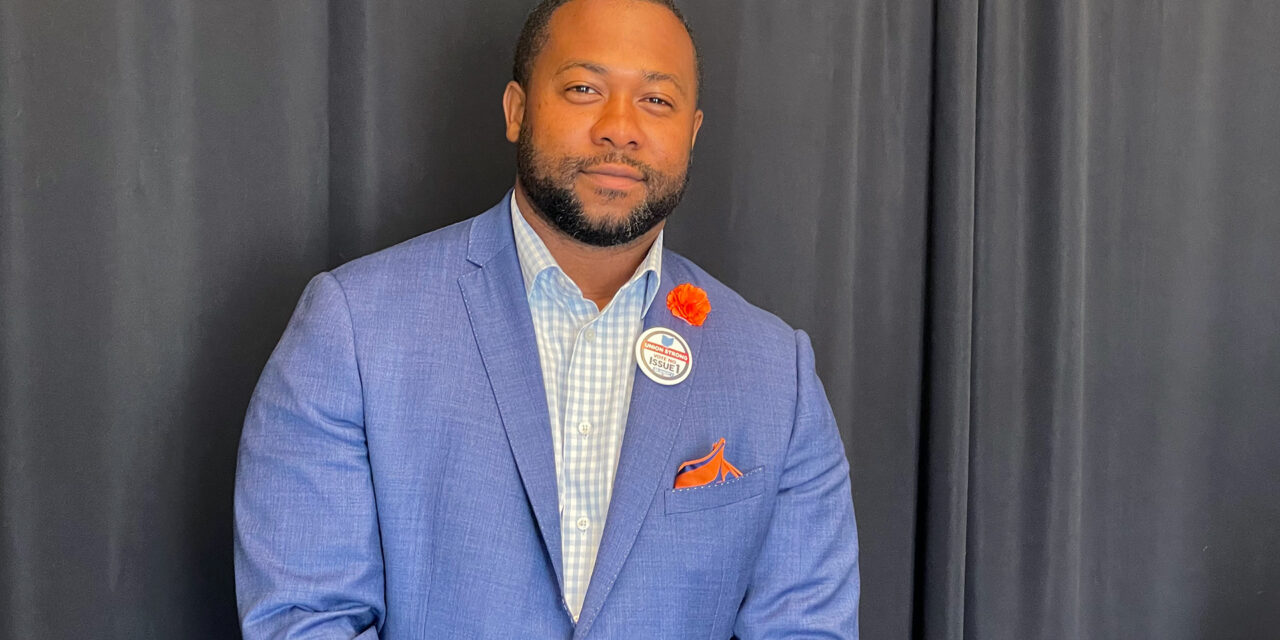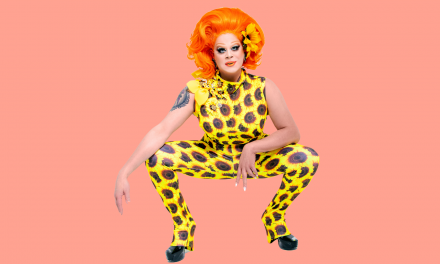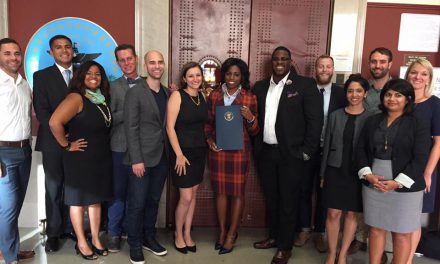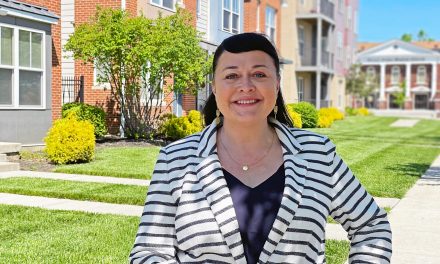Podcast: Play in new window | Download
Subscribe: RSS
Tim Fulton 00:11
Ladies and gentlemen, welcome to the confluence cast presented by Columbus underground. We are a weekly Columbus centric podcast focusing on the civics, lifestyle, entertainment, and people of our city. I’m your host, Tim Fulton this week. In anticipation of this fall’s election the confluence cast is endeavoring to introduce Columbus voters to the 12 Council, and two mayoral candidates in their own words. In today’s interview, Christopher YH. unopposed candidate for district one discusses his background, the issues that he believes face Columbus going forward, and why he is running for office. You can get more information on what we discussed today in the show notes for this episode at the confluence cast.com. Enjoy the interview.
Christopher Wyche 01:03
Sitting down here with Christopher White’s Columbus City Council candidate for district one, Chris, how are you sir? I am good. Thank you. Thank you for having me. Absolutely. Just to kick things off, tell us about yourself and what brings you to your candidacy? Sure, I will do and one first, I want to take a moment to say thank you for having me, again. As a first time candidate, you know, you’re always looking for ways to kind of name raise your name profile. And obviously, you guys kind of doing these interviews are a great way for folks to get to know me, especially those who are not kind of reading in the traditional sense. In addition, you know, this is a confusing time right in Columbus as we were making this transition to a district based system. And so I’m sure there are a lot of questions and trying to answer those as best as I can. It’s probably going to be helpful for voters out there. So me what why Who am I am? Why am I doing this? Yeah. So one, I will say I am originally from Boston. Don’t hold that against me. Okay, I am an Ohio Wesleyan University grad, graduated in 2008. I actually spent a lot of time during school and after school kind of flying back and forth between Boston and Ohio. Yeah, my daughter was born my sophomore year in college. And so she actually kind of motivated me to do the right thing. As you can imagine a freshman having a child their sophomore year, yeah, my attention was not on my education. And so when it became about someone other than me, it was like, Alright, let me focus in and do what’s necessary because I have a child out there. So she kind of kept me tied to the state of Ohio, going back and forth. When I graduated from Ohio Wesleyan University, though I ended up going back to Boston, my degree was in financial management, but I learned quickly had no interest in helping wealthy people stay wealthy, it just didn’t fill my bucket, as my child would say, these days. And so I wanted something that was a little more community focused. And so I began working at United Way in Boston, supporting some truly great nonprofit organizations that were doing great work in the city. It was during that time, it really kind of opened my eyes to the fact that a lot of our nonprofits simply act as band aids, right, trying to stem the bleeding that is happening, that should be addressed by their local government. And so, you know, it was around that time, I thought to myself, look, I think I need to kind of make a change, and maybe kind of do some policy work, because, you know, I want to have a positive impact. But I’m not really seeing that from the nonprofit side of things. Fast forward to 2009 2010, we’re in the middle of a recession, right. And working for a nonprofit organization where my responsibility was to raise funds, clearly was not going to work. During that time, a lot of the companies in my portfolio, either went away or start stopped supporting the community. And for me, it felt like the stars were aligning for me to do something different, right? My organization was going away. So I was getting laid off. I was finding the cost of living in Boston to be a nightmare. I think I was paying at the time $2,400 on a mortgage, struggling to get roommates to kind of move into the house and stay there consistently. And then a former associate, now my wife was living in Columbus. And I remember she told me, you know, I’m closing on my house at the end of the summer, and you know, I’m gonna be paying less than 700 bucks on a mortgage. I’m like, Oh, my God, am I doing here? And then at the same time, being in Columbus was just an easier way for me to kind of spend time with my daughter. So it’s like, alright, it is time to go I’m gonna leave Boston behind them moved to Columbus and start this new life. It was interesting because, you know, when you live in these bigger cities, and you telling people at the time, you know, I’m moving to Columbus, a lot of folks looked at me kind of weird like, why Why Why would you do that? And my reason was, is fairly simple one, I want to better cost a cost of living. But two, I want to have a positive impact on the community. And I felt like Columbus was I had a better chance of doing that. And Columbus, Boston is a very old established city, it is hard to turn that ship like it is kind of moving in the direction that it was moving in. Whereas Columbus felt like a young up and coming city to me. And so I felt like, you know, what, enough time and energy kind of focused in one direction, you know, I could accomplish that goal. Yeah. So I moved to Columbus, actually, July 30 2011. So I’m coming up on my 12 year anniversary, a couple of weeks or a week and a couple of days. And packed up, my car moved out here by July 31. I was a resident of Columbus, we started on the west side, kind of living in West Gate. And it was immediately clear to me that things in Columbus were slightly different than what I was experienced in Boston. Okay. We were heading into an election year. And then obviously, I saw this commercial where you know, it. And I, my memory is fading, but it felt like three council members were linked ARM and ARM walking down the street. It was a weird commercial for me coming from Boston, where everyone’s a Democrat. But it’s a little bit more cutthroat from that perspective. And so I was like, wow, this is kind of different. Right? It seems like there is a collaborative approach as it relates to city governments. And I kept finding that from a nonprofit sector to like everybody wanted to help and be at the table. I think that’s one of the things that Columbus does very well at like we’re very collaborative city. When I moved here, I was doing some consulting work for United Way, then quickly found myself working at City Air Columbus, which for those who are not familiar city, or puts AmeriCorps volunteers with some more and more challenging schools, he challenged schools here in the city to kind of change the culture and kind of keep students on track towards graduation, which I lived, there was a little bit more direct service, or at least I was a little closer to the ground, and I had been with United Way. But still using those skill sets in terms of raising money and kind of raising awareness for the organization in Columbus. My time at City Year, wasn’t as long as I would have preferred. I think when I started, I was the fourth person there. And I quickly started doing more than just my job responsibilities. So media relations, government affairs, marketing, communications, but also development work and HR. At the same time. There was a decision made to hire my new boss, who essentially, she and I just did not get on the same page. And so it just wasn’t a good fit, okay. They terminate the position, and they just didn’t have a development manager. And so I’m out here in the community thinking, you know, what am I going to do next, and actually spent some time volunteering with the Columbus Metropolitan Library over on the west side doing kind of computer support. And it’s, it’s weird, because you know, I’m a millennial, we grew up with computers, that was the norm, right. But there were just so many people who did not have experience using computer getting online applying to jobs, and like, really just needed some guidance. And I loved it. I mean, it just kind of reinforced what I already believed is that this work that, you know, I’m drawn to was anything that was going to help give that positive impact to the community. And so I’ve did that for several months. And then corporate America came calling right and so 18 T was looking for someone to do external affairs. And for them, it was kind of a mix of community legislative and business affairs for the company. But it was covering all of Northwest Ohio, and I’m like, oh, man, this is a lot. But I need a job. And I’m going to take it and this is getting me a little bit closer to where I want to go. Plus, it was kind of the next step in the evolution right of having a positive impact. Instead of doing the work directly, I could work with several different nonprofits across the state supporting the work that they were doing. And you know, you know, we really need organizations or companies who care about their community are willing to step up and support them in some way. So I started covering all of Northwest Ohio, then Central Ohio, now a cover, you know, northeastern Ohio doing the same job for the company. It was during that time that I also started to do a little bit more community involvement right. I was approached by the governor’s office to serve on Central State University’s Board of Trustees, and I am going on my seventh year on the board, have loved that experience kind of working on this side of how Education and what that looks like and how we can better support our students. I started on the board for the Ellen and Elsie Ward YMCA on the Near East Side, first as the vice chair, and then as the chair of the board, kind of supporting the work that we were doing there. And then second, I got involved in this organization called the New Leaders Council. And for those who are unfamiliar, New Leaders Council is really a leadership development program for progressives who are looking to take on leadership roles kind of in the public, nonprofit private sector, really just kind of giving them the background and experience and training necessary for them to be successful. I completed that in 2019, quickly joined the board, and became the co director for the organization starting in 2020. national organization, correct. It is a national organization with local chapters, one here in Columbus, and then we have a Southwest chapter as well. So again, reinforcing all the interest that, you know, I wanted to be supportive of the community. And then, you know, finally this, this opportunity for counsel kind of came around I, I honestly did not think that I was ready enough to even run for office. I mean, I’ve put my name in the hat a couple times. And even as a newbie of Columbus, I’m like, Look, if you’re gonna appoint someone appoint me because I care about the community. But I think sometimes you you get that imposter syndrome, right? I didn’t, I don’t have a Master’s in Public Affairs, like, you know, I’ve never worked in government. So maybe this wasn’t my time. But then the opportunity really kind of presented itself with this district based system. I knew there were no council members in my district, and having worked with elected officials all over the state. Some really great, some not so great. I knew that I did not want somebody who was not going to be great representing my part of the city. I mean, I felt like the progress we were making in Columbus was great, but can easily be derailed by somebody who was getting in for the wrong reasons, right. And so the reason for me is simple, right? I love the city. And I care about the direction it’s heading. And so I just want to play a role in helping shaping what the future looks like, I have three kids. And so I want to ensure that this is a city that they can grow develop in as well in the future.
Tim Fulton 12:29
Talk us through the issues that you see Columbus facing and how you as a councilmember would address them.
Christopher Wyche 12:36
Yeah. So I think there are five challenges that we’re kind of facing, okay, as a city, and there’s probably others, but I think these are some some major ones. One housing, right, like I think is pretty evident that the cost of housing is going up dramatically. Because the cost of living here in Columbus is cheaper than on the east west coasts. And from a business perspective, our reach to the country as a whole is extremely important from a manufacturing shipping standpoint. And so folks are relocating here. In addition, I felt like the city had rightfully so focused heavily on economic development, right, coming out of the recession. That makes sense, right. Yeah. That is the majority of our budget and where it’s coming from. But the pivot to investing in housing should happen a while ago. And so it’s nice to see now that we are seeing those investments by council to build more affordable housing in our city. It’s important to transit, right. And sometimes I feel like maybe I’m the crazy person running around with a flag telling folks Hey, we need to invest in transit heavily. Because folks love their 20 to 2025 minute commutes around the city and feel like it’s never going away. Let me be the first if you have not already heard your 25 minute commute is going away. It will be 45 It will be an hour. It will be hard to live in the city if we don’t invest heavily in transit. It is nice to see that Linkous is moving forward, I think. I think it is definitely a step in the right direction. I feel like it should have happened like 10 years ago so we can start reaping some of the benefits of that now. I think once it’s fully built out, we will find that it is not enough. And for me, I really kind of owe my life to public transit. I mean, growing up in Boston, that’s how I got to school. It’s how I worked summer jobs. I worked my regular job. It’s how I truly experience the entire city as a whole. And so seeing that investment because we are such a big city from square footage standpoint. It’s already evident right? I think it was more worse when before the pandemic and the pandemic has ease some of that transit and traffic issues but that’s only going to last for so long with you know, now 3 million people scheduled to move to the region. As we continue to densify, traffic will continue to be a problem and an issue. Third, youth and workforce development right? I think, not I don’t think even before the Intel in the Honda’s of the worlds make their announcement, workforce development was already an issue for especially in the tech space, right, we just did not have enough students getting into STEM and graduating in those fields and staying in Columbus that are necessary to kind of support a tech hub that we’re looking to create here in the state of Ohio. So now with Intel, and Honda and all the development now it’s even in the skilled trades program, right. And so we just do not have enough people to build in design, all the development that’s happening around the city. And so it’s important for us kind of focus on that. And we can utilize city resources and assets to kind of get more skill based training for our residents. For if and I don’t think it’s talked about often, but climate change, right, we don’t live on a coast. And so it’s really not on people’s radar. But this has been one of the hottest years ever, and we are starting to see the strain on our electrical grid, as temperatures continue to rise. We’re having extremely high highs, extremely low lows, investing in I’m sorry, ensuring that we are having the appropriate housing stock to prepare for that or mitigate the issues of climate change, you know, having those resiliency centers around the city. So when folks do experience electrical outages are or dealing with, you know, heat issues, they can have somewhere to go to stay safe. And I will say the fifth issue, and this one’s more challenging, right, because it’s not one in which we can strictly address, but we have a state house that is focused on drag shows abortion and rigging the system to keep power instead of focusing on the number one issue that would address public safety, which is guns, they just refuse to do anything about guns. And because of that, we just have too many guns on the street. And you’re seeing that in homicide rates and gun violence deaths that are happening in Columbus. Most of these problems are not issues that Columbus is facing all on their own right, these are problems that most big cities are experiencing. However, because of the rapid growth, it’s kind of exacerbating the problem for us. And so it requires council members who have that unified vision for where we’re going as a city and collectively working towards that. So you’re starting to see some progress on housing, I think there’s more that needs to be done. There are a lot of NIMBYs out there who are pushing for developments to happen in other parts of the city and not their neighborhood. It needs to happen all over the city. From transit perspective, I think Linkous is is a start, right, I’m not going to say that it is nothing, there’s definitely a start in the right direction. I feel like there’s more we need to be doing. And so in ensuring that we go ahead and purchase those land, that land that’s going to be necessary for future transit development is going to be important. Foreign from a youth and workforce development standpoint, I think I mentioned this a little bit, but using city assets and resources, right, we have a lot of great community centers, let’s put the program necessary. And that’s gonna require some collaboration with nonprofit organizations who are doing some of this work, let’s bring it in house and kind of work together and track the data to make sure that we’re actually having the impact that we’re looking for. environmental standpoint, I think the city has already put out their climate action plan, but a lot of the components are going to be finalized over the next two years. So 2024 2025, those are important years from environmental standpoint, especially zero carbon housing, specifications, like playing an active role and helping to shape that is going to be important, you know, from the Statehouse perspective is really just kind of using the platform to continue to push folks and bring their attention to those who have a direct impact on addressing gun violence in our community.
Tim Fulton 19:19
Pivoting a little bit. Yeah. You haven’t experienced it yet. Frankly. None of us have experienced it yet. Talk about how you feel about the new districting system.
Christopher Wyche 19:29
Yeah, so one, I am excited to represent the crown district as we’re calling district one here. I did catch your show. And I’m curious if you guys got any other names for any of the other
Tim Fulton 19:42
I the North. I know you may win with the crown, you know, yeah. usurping the name.
Christopher Wyche 19:50
Yeah, no, no worries there. So it’s a step in the direction we were looking for, right. We as a city for a long time have wanted more accountability and representation on council, right? I feel like this system does that you have folks who live in your specific district, they will definitely be there to address any challenges or concerns. Obviously, there’ll be committee chairs, and there’ll be directly tied to some of the outcomes that those committees are doing. But we’re your neighbors, right. And if there’s a problem, regardless of if I sit on that committee or not, I want you to reach out to me, I want you to see me in the grocery store and say, Hey, Chris, can I chat with you about something so that I can represent your needs your concerns on city council? I’ve had the pleasure of working with council members all over the state of Ohio, some strictly Ward based systems at large base systems, there are pros and cons to both of them, right? Maybe the system we have is superior? I don’t know, I think we’re going to have to wait and see how it works out how it shakes out. And if there needs to be a change, then we should work to change that system. Anytime you do something new like this, I think you’re always going to have people who are confused by it, but also folks who are going to be in opposition to it, right. But regardless of what we would have put in place, that would have been some of the outcomes either way, right. So I think we have to give it some time and see how it’s gonna play out.
Tim Fulton 21:25
That’s fair. Wrapping up from a large pillar perspective, talk us through what your value proposition is that you bring to your candidacy. Basically, why should folks vote for you?
Christopher Wyche 21:38
Yeah, so great question. So one for over a decade, I’ve kind of worked at the center of the for profit, nonprofit and public sector, right, negotiating public private partnerships, organizing community and workforce development programs, and working on policy issues to kind of move our region for it. So I have the experience necessary to kind of do this job on city council. In addition, my reason for being on council is pure, right, I just genuinely care about the city like I adopted this as my home. I love what we are doing, I feel like we could be doing more to support our residents. And so I want to see it done. Right. It was surprising to me that, you know, there weren’t a number of folks kind of knocking at the door wanting to be on city council. I think some of that is just due to the confusion around the district system. Some of that is people don’t feel like they have a role in city government. Like they feel like oh, I didn’t go to the greatest schools, I don’t have, you know, years of experience. I’m not a lawyer, like, hopefully you see my candidacy as something that motivates you to get involved, because you can like this is the greatest part about Columbus is that you can get involved if you want to, it’s perfectly there for you to kind of dive into a circumstance. And so for me having that experience working with councils all over the states, having, you know, my experience working directly with nonprofit organizations to impact our community. You know, I feel like I’m a great candidate to kind of add to the city council team, because it’s not something solving these challenges, not one is not something one council member can do on their own, you’d kind of need to work as a team to get there. In my background, my experience is slightly different than those who are currently on council and those who are seeking to be on council and will be necessary for us to kind of plan for the future.
Tim Fulton 23:40
Got it. I wrap up every interview by asking two questions. One, what do you think Columbus is doing? Well, and what do you think Columbus is not doing? So well? You’ve what’s interesting is during over the course of the interview, you sort of said exactly those things. Yeah. Maybe I could solicit just something different or something. Not as impactful. Right.
Christopher Wyche 24:13
Well, I mean, I will say this because I think it is two sides of the same coin. Right? When I came here, the collaboration was evident, right? Everybody wants to come to the table to address challenges and issues. That is amazing. Most cities, you’re not getting that experience. If you want to do something, you’re essentially on your own. And so the fact that folks are willing to come and support you is exciting to see and one of our strongest assets as a city and as a community. The flip side of that same coin is that the voices at the table when this collaboration is happening have not been diverse, right? There just got not been enough people from different walks of life, being at that table to address some of those concerns. rents. And so it’s one of the reasons why I’m running to kind of be a different voice that can kind of add to the conversation and say, Hey, have we thought about this? Have we looked at this and question what has kind of always been the norm? So I’m excited to play that role, but I still think there is some work and some growth that we have in that area.
Tim Fulton 25:19
Got it. Chris, thank you for your time. Thank you. Thanks for listening to the conference cast presented by Columbus underground. Again, you can get more information on what we discussed today in the show notes for this episode at the confluence cast.com Please rate subscribe, share this episode of The confluence cast with your friends, family, contacts, enemies, your favorite lobbyist. If you’re interested in sponsoring the confluence cast, get in touch with us. We can be reached by email at info at the confluence cast.com Our theme music was composed by Benji Robinson, our producers Philip Cogley, I’m your host, Tim Fulton. Have a great week.





